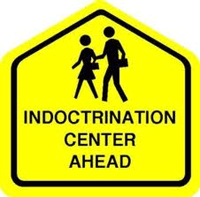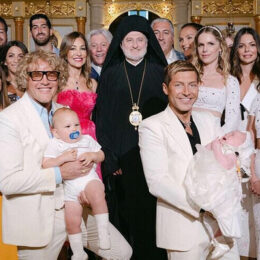 by Daren Jonescu –
by Daren Jonescu –
Of all the arguments public-school advocates have used to hoodwink generations of parents into condemning their own children to years of state-controlled subservience training, one of the most successful is that without public schools, children cannot be properly “socialized,” and will therefore be ill-prepared for life in the “real world.” Not only is this argument absurd on its face, but that face also reveals the ugliest intention of compulsory schools: the deliberate retarding of human moral and intellectual development.
The basic premise of the argument for public schools as necessary tools of socialization is that learning to get along, or fit in, with children one’s own age is a vital life skill. Is it?
Childhood, contrary to the worst tendencies of democratic thought, is not an end in itself. Common sense teaches us that a child is an immature specimen, a partial view of humanity. A researcher from another planet who examined only children would never understand the human race, for he would not have seen a fully actualized instantiation of the species. A child is an entity in flux, a potential being with a natural goal, but one which may be actualized to widely varying degrees of success, depending on the conditions of its growth.
Children are potential adults. Their proper development requires, therefore, that they gradually learn how to be adults. That is, they need to be encouraged to develop the character and intellect suitable to adult life, in order to fulfill their natural potential, by which I mean human nature itself. To thwart this development is to stunt the fulfillment of nature. To thwart it deliberately is a moral crime.
Everything in a child’s upbringing ought to be focused on the aim of achieving the most successful adulthood. This means finding ways to ignite interests and enthusiasms that will lead him to develop the faculty that defines his chances as an adult, namely reason, and the states of character that will prepare him to face adulthood’s vicissitudes and temptations without succumbing to indignity and unrighteousness, namely his moral virtues. This does not mean “taking the fun out of being a child.” Nor does it mean expecting children to “think like grown-ups.” What it means, rather, is that the fun of being a human child should come precisely, or primarily, from applying one’s childlike thoughts and sentiments to the task of learning how to be a grown-up.
This is not a bureaucratic recommendation; it is an imperative of nature. It explains the hero worship children commonly feel towards older siblings, and their desire to emulate their parents. “Potential,” as we have known since Aristotle, is simply nature’s desire expressed in metaphysical terms. Children naturally pursue knowledge of their surroundings, and admire that which they perceive as a more complete version of themselves. They hope to achieve a fuller existence by modeling their behavior on that of others who appear exemplary of the more mature state that they have not yet attained. Contrary to today’s pop psychology and the progressive kindergarten ethic that dominates education theory, this constant effort to find and emulate exemplars of maturity is not a burdensome chore for children, or a cruel deprivation of the pleasures of childhood. The most powerful natural desire of a child is the desire to grow up, and the satisfaction of desire always brings immediate pleasure.
This last point, however, is both the key to educating children and the secret to undermining true education. Desire and pleasure will motivate children; this is inevitable. The question is whether the dominant desires will be those conducive to the fulfillment of our nature as rational, independent beings — the inheritance of millennia — or other desires which curtail that proper development, trapping children in an avalanche of confused feelings and self-doubt that permanently block the road to mature adulthood. This is where the environment in which education takes place becomes all-important.
Two conditions are paramount in establishing the environment for the child’s proper development: opportunities for patient examination of naturally interesting things, and opportunities for interaction with reasonable examples of adulthood.
The first condition enlivens the child’s capacity for analytical thinking by appealing to his natural curiosity. The hours of fascination that young children can derive from examining insects in a field is a common example of this. I have taught boys who were difficult to manage in a classroom, either due to “laziness” or “daydreaming,” but who lit up with the focused passion of a great scientist when talking about bugs. Dragging them away from this passion and back to the detached, unreal world of the classroom is a perfect example of how to kill intellectual growth at its roots, by smothering a sincere desire for knowledge. This forcible removal of the child’s mind from its fruitful realm of natural curiosity stifles the motivation to reason, to categorize, to understand; and this stifling process is what modern education is all about.
The second condition for learning, interaction with exemplary adults, is important as a means of showing the child what he is aiming at. Contrary to the mantra of progressives, who aggrandize childhood because they wish to trap everyone in that state of trusting dependency in which he may be more easily manipulated, children themselves instinctively gravitate towards imitating the grown-up behavior they see around them. (Think of the children’s tea party.) If they see dedication, sobriety, and righteousness, they are likely to emulate them. If they see the opposite of these things, they emulate what they see, and become the useful idiots of progressivism: lacking confidence in their ability to care for themselves, lacking seriousness in assessing their situation and making plans, and lacking the basic respect for others’ property and person that makes civil society possible.
Consider, now, how public schools address these two necessary conditions of human moral and intellectual growth. The primary fact of life in a public school is that the child will be restrained within a large group of children his own age for most of the day. This severely reduces childhood’s precious opportunity for independent investigation. In addition to the physical reality of being forever confined to the company of others, the child faces the endless insistence, direct and implied, that he must accommodate himself to those others, get along with them, think about what they are thinking about, act only in reaction to their instigations, and, most of all, avoid getting on the wrong side of the majority of them. (I have just described John Dewey’s philosophy of education in a nutshell.) Children who have not yet developed courage, self-reliance, and any practical means of protecting themselves are easily susceptible to fear of not fitting in, or of being disliked. Fear, then, takes the place of curiosity as the primary impetus. This creates a new, unnatural set of desires which displace the natural desire for understanding: the desires to be liked, to be accepted, to be protected, or to escape, fill the void left in the child’s heart after the state forcibly curtails the intellectual adventurousness of the wandering bug-studier, stargazer, or bookworm.
Nature’s window of opportunity for learning how to concentrate one’s thoughts fruitfully and channel one’s feelings productively is relatively short. If this opportunity is missed or ill-used, the resulting adult life will be less than it ought to have been. And the damage done through such missed opportunities cannot simply be repaired later. Humans are creatures of habit, both mental and emotional. Adults can change their opinions, or develop new tastes; new ways of thinking or states of character, however, are a far more difficult matter.
The conservative version of the “socialization” argument is the “learn how to survive in the real world” argument. But the “real world” is precisely what public school is designed to prevent children from experiencing. Prefabricated areas of study, artificially imposed regimentation of one’s time and mental space, and almost complete deprivation of privacy and the ability to pursue specific, idiosyncratic areas of curiosity exclusively for a while — these daily oppressions of public school existence do not prepare children for any real world you would want them to inherit. Rather, they are preparation for practical enslavement in a progressive authoritarian conception of society as a vast assembly line of interchangeable “worker units” — which, by the way, is precisely what compulsory government education was created to produce, as some of its early promoters had the decency to admit.
The same goes for the related fantasy that surviving the public school’s social pressures will “build character.” Parents who tell themselves this are attempting to live vicariously through their children, while forcing their children to take all the risk. You may tell yourself all day long that your child is strong enough to withstand the pressures of public school life. You are probably wrong. Children do not have a set character with which to face challenges to their will and their moral habits. They can only take so much. The ability to stand firm on principle against the fear of rejection, humiliation, mockery, and belittlement is a trait of mature adult character. Even among adults, such strength of character is rare these days, as anyone can see by observing the U.S. Congress. It is too much to expect a mere child to exhibit such strength against the level of social threat imposed continually in a public school classroom. If a child survives with his soul relatively intact, it will not be without severe damage to his faith in life, his sense of hope, and his belief in mankind. He will suffer years as an outcast — he must do so, if he is to have a chance of coming out with his soul alive.
This is not because the other children in the school are any less naturally moral or rational than he is. It is because they are all children — and this usually includes, for all intents and purposes, the teachers. Children are not yet rational; they are all looking for direction, and in need of mature examples and the private time to begin reasoning. Deprived of these necessities for so much of their young lives, they are all in the same boat — a lifeboat adrift in a violent sea of confusion, fear of others, fear of being alone, boredom, and an animal’s instinct for survival at all costs, with no land, no rational grounding in sight. If this sounds like the “real world,” that is only because the world is increasingly populated by the products of compulsory public school education.
“Preparing” your child for such a world is a euphemism for condemning him to life as a citizen of progressive hell. If mankind is to have a rational, moral future, that future will ultimately belong not to the damaged survivors of public school, but to the “unprepared” and “maladjusted,” namely the bug-studiers, stargazers, and bookworms: those whose intellects and character were permitted to develop naturally, with curiosity, not fear, as their impetus, and self-sufficient adulthood, not “socialization,” as their goal.
Something has gone terribly wrong with the modern world, and public education is at the heart of the problem. The solution will not and cannot come from a publicly educated population. Begin the process of liberating children’s souls now, so that in the future there will once again be Thomas Jeffersons and Benjamin Franklins to do what will need to be done.
HT: American Thinker



